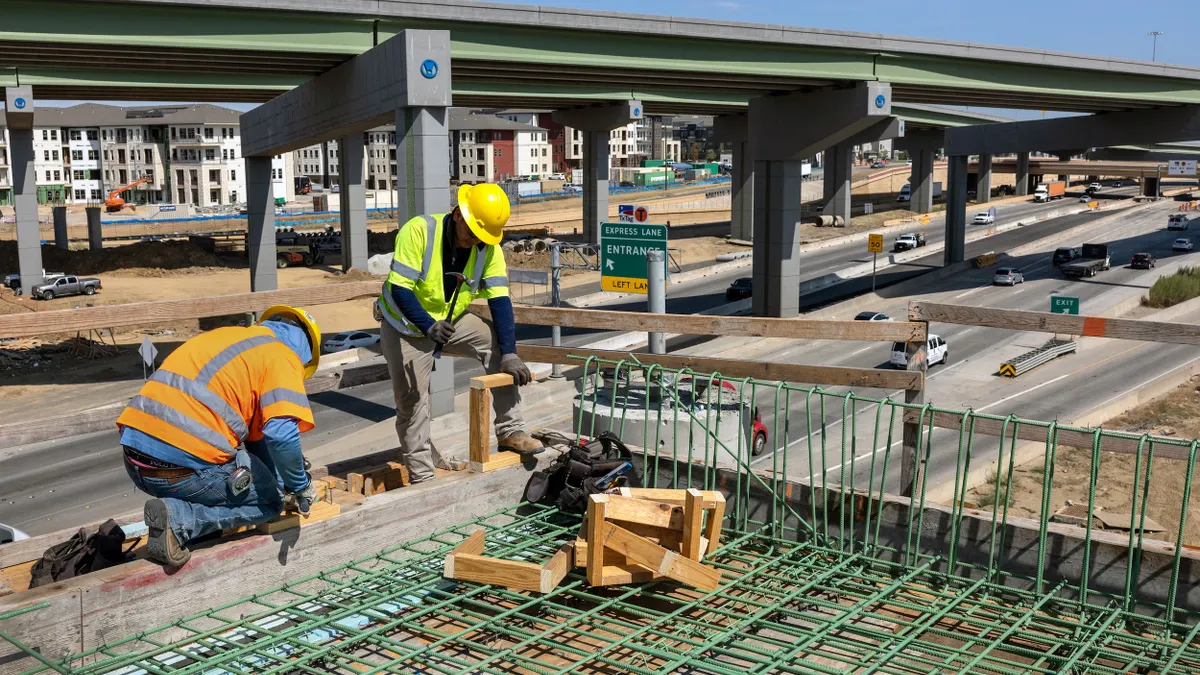Dive Brief:
- Granite's stock slid Friday to a one-year low of $31.02 a share, and ended the day down 6.2% at $32.41 after the construction company reported a fourth-quarter loss and revenue figures that disappointed Wall Street. The Watsonville, California-based company blamed bad weather in the West and its continuing shift away from large-scale projects.
- Granite Construction lost $13.2 million, or 28 cents a share, in the fourth quarter of 2021, compared to a profit of $8 million, or 17 cents a share, in the year-ago period. Revenue slid almost 18% to $683.2 million. That was nearly a third lower than analysts' expectations of $960.7 million.
- Granite's backlog (the jobs won but not started) fell to $4.01 billion, basically flat from year-end 2020. But the backlog also declined by $55 million from the third quarter of 2021.
Dive Insight:
With his company's stock down more than 10% Friday morning, Granite President and CEO Kyle Larkin was blunt with stock analysts: "I'm disappointed with the results of our fourth quarter, particularly the losses that occurred in our old-risk portfolio. We all understand the importance of getting these projects behind us and executed so that we don't have a repeat of the performance."
Excluding one-time gains and losses, Granite reported net income of $1.9 million, or 5 cents a share, in the fourth quarter. But even that rosier per-share figure was a sliver of the 36 cents analysts expected, according to Thomson Reuters.
The company also set muted financial guidance for 2022, including:
- Low single-digit growth in revenue from continuing operations.
- Adjusted EBITDA margin from continuing operations in the range of 6% to 8%.
- SG&A Expense from continuing operations in the range of 8% to 8.5% of revenue.
- Low- to mid-20s effective tax rate for continuing operations.
- Capital expenditures from $100 million to $115 million.
While Larkin said Granite, which bills itself as "America's Infrastructure Company," was enthusiastic about the passage of the $1.2 trillion Infrastructure Investment and Jobs Act last fall, the company likely won't see any benefit before 2023.
"We begin 2022 as a changed company from a year ago, but we still have work to do," Larkin said. "We are acutely aware of the need to learn from our recent struggles so we can improve our performance and create value for all our stakeholders."
He highlighted the 100-year-old firm's divestiture of the water and minerals services group, announced earlier this month, to focus on its core business of civil construction and asphalt and aggregate materials business.
Looking ahead
Appointed CEO in September 2020 in the wake of accounting irregularities that forced Granite to restate financial results for several quarters, Larkin has focused on winning smaller, less-risky projects to offset the headwinds of inflation and employment shortages.
He highlighted the reduction of large-scale, design-build projects to 10% from 25%. Those "mega" projects, which are often worth more than $500 million, are riskier because of the longer completion timelines, during which prices and labor availability can vary tremendously.
Contractors also typically submit bids on design-build projects when only 30% of the design is complete, versus bid-build models, where a project's parameters are clearer. Larkin said that is the business he is focused on now.
"It was clear that our company's core competencies lie on our civil construction and material businesses," Larkin said. "Granite's future should be built around a return to our core skill set."
Full-year profit totaled $10.1 million, far better than the year-ago loss of $145.1 million. Revenue was $3 billion, down almost 4% from 2020.
Granite's results followed generally sluggish reports from its peers.
Fluor and Lendlease both reported hundreds of millions of dollars in losses in their most recent financial periods, while Jacobs, Skanska and Tutor Perini each saw profits fall. Of large contractor and engineering firms, only AECOM has posted mostly upbeat results, showing improved profitability and raising its guidance, in spite of its revenues falling slightly.















